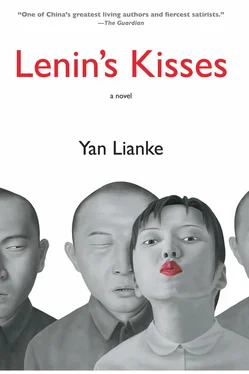He said, “You can see, and therefore you see the entire world as dirty. I can’t see, and therefore I see the entire world as pristine and pure.” He added, “I can’t see, and am always saying that I should be allowed to fall to my death. But actually, I never really want to die. You can see, and although you’ve never said that you wanted to die, I’m sure that you think about death many times every day.” It’s unclear whether or not the young woman really did always think about death, but when the young man said this, her eyes immediately started to tear up. She said, “Brother, I’ll lead you out to the field to watch the livening festival.” The blind man started to hand her one of his canes, but was worried that it would get her hands dirty. Therefore, he decided to keep this cane that had just fallen to the ground for his own use, and instead handed her the one he himself just had been using. She could feel the warmth of his hand on the cane, and where he had worn it smooth.
Together, they went to watch the livening festival.
Afterward, they proceeded to spend the entire rest of their lives together. They had a son and daughter, as one generation begat another.
However, this year’s livening festival was not hosted by Grandma Mao Zhi, nor was it held in celebration of the harvest; rather, it was hosted by Chief Liu in celebration of something he himself was organizing. Chief Liu had gone to see Grandma Mao Zhi, who was in her courtyard feeding her dogs as though they were her children. The dogs were also disabled — some of them were blind, some were crippled, and others had lost all their fur and their backs were full of scabies, like the uneven surface of a mud wall. There was also a dog that for some reason didn’t have a tail and was missing an ear. This courtyard abutted an earthen cliff, and on either side of the courtyard there was a small building. On the south side, there was a thatched hut that served as Grandma Mao Zhi’s kitchen, and on the north side there were two earthen dugouts that Mao Zhi used as doghouses. In front of the dugouts were a pig trough, an old washbasin, a handleless wok, and a new earthen pot, all of which Mao Zhi used to feed the dogs. Dogs don’t fight for food the way pigs do, and they ate the corn-paste gruel that Grandma Mao Zhi put in their basins, pots, and woks. The courtyard was full of the sweet scent of ripe corn, and the sound of the dogs lapping it up. There was a mutt that was already more than twenty years old, which in dog years was equivalent to about ninety human years. The dog was so old it could no longer move, and therefore Grandma Mao Zhi placed half a bowl of corn gruel in front of it, and it just lay there and slowly extended its tongue into the bowl to lick up the food.
By that point, the sun was already high in the sky, and the courtyard was completely still. You could hear the sound of villagers working in the fields, calling out to their oxen as they plowed the fields — their voices rising and falling like the music to the Balou tune “Birds Flying.” As Grandma Mao Zhi fed her dogs, she heard the door behind her open, and when she turned she saw Chief Liu standing in the doorway.
She looked over at him, then turned and continued feeding her dogs.
Chief Liu remained in the doorway, as though he had expected this and was not at all embarrassed. He gazed at the two buildings on either side, and then at the row of dogs eating their food, as they all silently stared back at him. He wanted to come inside, but seeing the dogs standing there as though they were ready to rush at him as soon as Grandma Mao Zhi gave the word, he decided instead to wait in the doorway.
Standing with her back to him, Grandma Mao Zhi asked, “What do you want?”
Chief Liu tried to walk forward as he replied, “That’s a lot of dogs you are feeding.”
“Did you come to see my dogs?”
“I’ve come for disaster relief.”
“Then relieve it.”
“Our disaster relief funds and grain reserves are almost exhausted. When it hailed in Lianshu township the year before last, I didn’t go, and didn’t send them any money or grain. Last year when there was a drought in Zaoshu township and their entire harvest was lost, I didn’t go, and just sent them a hundred pounds of wheat seeds for each mu of their land. But this year, when it snowed in Liven in the middle of the summer and many households had to pull their grain out of the snow, I came to assess the situation and personally distribute money and grain. It’s entirely possible that, this way, you may end up receiving more grain than you normally would have gotten from simply harvesting it.”
Grandma Mao Zhi poured the remainder of the food into the dogs’ bowls, and said,
“In that case, I should thank you on behalf of the entire village.”
Chief Liu shifted his gaze to some date trees growing on top of the dugouts. The trees had lost all their leaves in the blizzard, but under the sunlight of the past several days several green buds had begun to emerge, as if spring had just arrived.
“No need to thank me,” said Chief Liu. “You should thank the government. You should host a livening festival, as you have in the past.”
Grandma Mao Zhi said, “I’m old, and don’t have the energy to organize one.”
Chief Liu said, “In that case, I’ll do it myself.”
Grandma Mao Zhi said, “As long as you are able to.”
Still standing behind Grandma Mao Zhi, Chief Liu began to laugh. “You’ve forgotten that I’m the county chief.”
Grandma Mao Zhi also laughed and, without turning around, replied, “How could I forget? I still remember when the higher-ups 5asked me to be township chief and I declined. You weren’t even born then, much less a soc-school teacher in the Boshuzi commune.” Chief Liu didn’t reply. He stood for a while longer behind Grandma Mao Zhi, snorted, then walked out of the house.
Actually, Liven didn’t have any village cadres. In fact, it hadn’t had a village cadre since Liberation, and instead it was loosely structured like a large family. Nearly forty years earlier, in the renchen year, 1952, the members of the commune wanted to join a larger brigade, but discovered that no brigade was willing to accept a village consisting of more than two hundred disabled residents. They therefore suggested that they form their own large brigade, but there were not enough villagers for that, and they had only enough to form a small production brigade. In the end, they weren’t considered either a large or a small brigade, but rather were merely a village in Boshuzi. Since they had all been brought to this township and county by Grandma Mao Zhi after Liberation, it was therefore only natural that she should take charge of village affairs. For instance, she was responsible for holding meetings, distributing grain, selling cotton, and helping relay urgent political announcements from the higher-ups. When two neighbors quarreled or a mother- and daughter-in-law got into a spat, Grandma Mao Zhi would need to resolve the rifts. Had Grandma Mao Zhi not agreed to settle down in Liven, by this point she probably would have already become a township or county chief. But given that she merely wanted to pass her days in Liven, she naturally became the village’s director. 7
If Liven was going to hold a livening festival in a wheat field, it was expected that she would be responsible for organizing it. Aside from famine years, she had been organizing the annual livening festival for several decades, and more generally was responsible for handling all of the village’s activities, big or small. Grandma Mao Zhi wasn’t exactly what people nowadays would call a village or town cadre — like the village head, Party branch secretary, production brigade leader, or village leader — since the people of Liven, unlike those in other towns, had not selected a village cadre, and neither the previous township or commune, nor the current township government, had come to Liven to announce who the village cadre should be. Whenever there was anything that needed to be done, however, the higher-ups would invariably come looking for Grandma Mao Zhi. She would consider their request, and some things she would manage herself while others she would decline on behalf of her fellow villagers, making the higher-ups go home empty-handed. Without her, there was no one who could take the lead.
Читать дальше












